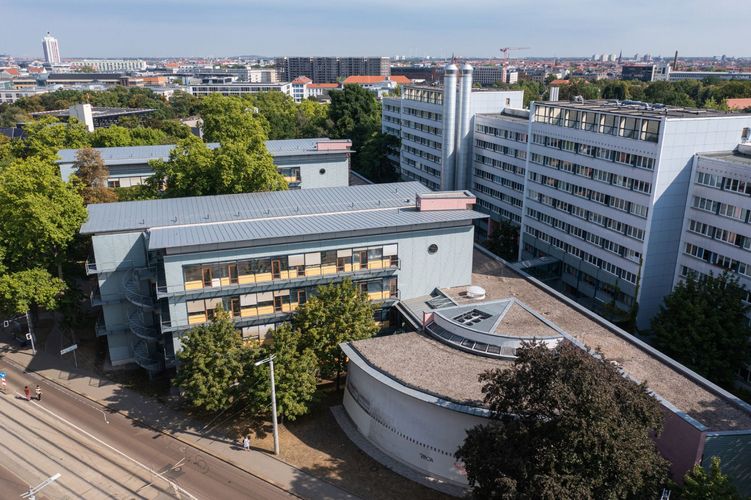The Structural Chemistry and Spectroscopy programme is an international degree course taught in English. It is research-oriented, introduces advanced spectroscopic methods, and centres around the structure of chemical and biochemical molecules, especially biopolymers. The focus is on the synthesis and structure elucidation of complex structures. Upon completing the programme, you will be able to act as a bridge to all areas of industry, business, state and society.
At a glance
-
Field of study
natural and earth science -
Degree type
postgraduate -
Degree
Master of Science -
Language of instruction
English -
Full/part-time
full-time, part-time -
Course start
winter semester, summer semester -
Admission restriction
without admission restriction -
Standard period of study
four semesters
-
ECTS credits
120
Requirements
- A first academic degree in chemistry or in another natural science or engineering subject.
- A total of at least 90 credits with a comparable proportion of chemistry-related content to the bachelor’s programme in Chemistry at Leipzig University.
- This must include content on inorganic chemistry totalling at least 20 credits, organic chemistry with at least 20 credits, physical chemistry with at least 20 credits and analytical chemistry with at least 10 credits.
- Laboratory work in the areas of organic and inorganic chemistry totalling at least 300 hours is also required or proof that this number of hours can be completed by the start of the master’s programme assuming studies continue in an orderly manner.
- Knowledge of English at B2 level of the Common European Framework of Reference for Languages.
The faculty will check whether the above requirements have been met and then issue an official notification. This serves as proof that candidate meets the admission requirements.
Contents
The Structural Chemistry and Spectroscopy programme is an international degree course taught in English with a strong focus on research. The master’s programme attaches just as much importance to a further deepening of specialist knowledge as it does to introducing students to the practical side of innovative work in science, as well as to solving problems when faced with the most challenging questions in modern technology and business.
The programme is based on the German-language master’s programme “Chemie” and is aimed primarily at students who did not complete a bachelor’s programme in chemistry in Germany. It introduces students to advanced spectroscopic methods, and centres around the structure of chemical and biochemical molecules, especially biopolymers.
The language of instruction is English. Special emphasis is placed on subject-specific English language skills. This ensures that international and German students enjoy a joint education with an international focus and makes it easier to engage in study stays abroad, make international academic contacts or conduct scientific work internationally in the future.
The programme consists of a compulsory area with 20 credits. In this area, four modules from the subdisciplines of inorganic chemistry, organic chemistry, analytic and physical chemistry or theoretical chemistry must be completed.
In the compulsory elective area (40 credits + 30 credits for internships), you can select modules from a list of appropriate topics. The three compulsory internships provide excellent preparation for independent research during the final thesis and for entering a career in research or the industrial sector.
The master’s thesis is typically completed alongside your studies during the second year of the programme.
- English-language degree programme
- Study stay abroad is possible
- Broad range of possibilities for selecting content in chemistry and the more interdisciplinary specialisations
The programme’s objective is to convey an appropriately broad base of knowledge that can be applied immediately. This will prepare you to take on positions in many areas such as:
- in the industrial sector, in particular in chemistry but also in physics, optics, medical technology and scientific instrument construction
- in research institutions outside of higher education institutions and at state institutions
- as a chemist at universities and higher education institutions in research and teaching.
One highly valued professional quality of chemists is their ability to systematically analyse and further develop complex scientific and technical processes from a material perspective. Because of these basic skills, chemistry graduates are also sought after in professional fields that are otherwise reserved for others, and in more distant areas such as management consulting, insurance and politics.
It is generally recommended that students carry out a study stay abroad. This must by organised by the students themselves.
Application
Course start: winter semester and summer semester
Admission restriction (NCU): no
Application period: 2 May–15 September for the winter semester; 1 December–15 March for the summer semester
Application portal: AlmaWeb
Please ensure that you read and take note of the further information provided on the pages “Online application” and “Applying for a master’s programme”.
International students can find information about application periods and how to apply on the page “International”.
Options in the winter semester: 2nd semester, 3rd semester and 4th semester – each without restrictions on admission
Options in the summer semester: 2nd semester, 3rd semester and 4th semester – each without restrictions on admission
Application period: 2 May–15 September for the winter semester; 1 December–15 March for the summer semester
Application portal: AlmaWeb
Special enrolment requirements: credits form (Anrechnungsbescheid)
You can find more information on our page for “Applying for higher semesters of study”.
International students can find information about application periods and how to apply on the page “International”.
Internationality
Compulsory curriculum in English
